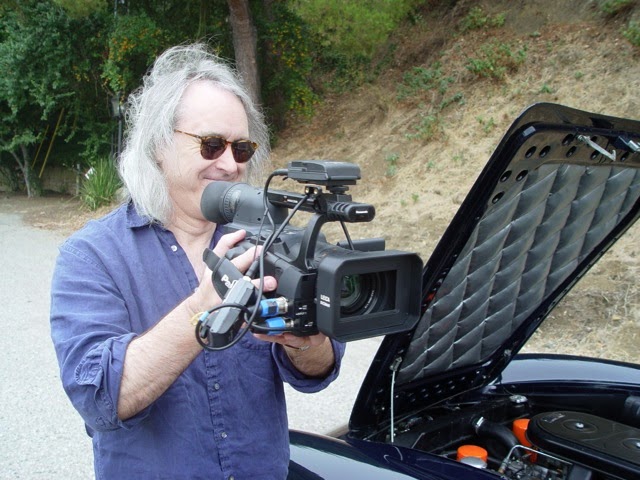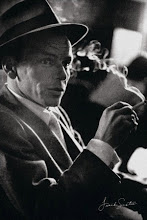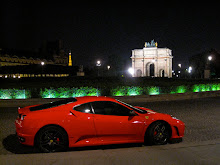(Dan, my brother-in-law, and Sidney playing Gin Rummy)
For a significant period of our lives, my father and I independently bought and sold automobiles for a living and for sport. For a living because the activity remunerated us nicely and for sport--well, that's more complicated.
The sport for me was that I was buying cars that I enjoyed driving during the time I had them--everything from Ferraris and Maseratis to Porsches and Corvettes at the upper end of the spectrum to Mustangs and Camaros at the lower end. My bargain-basement, high-volume specialty items were Volkswagens. For my sins, I bought and sold two Chevrolet Corvairs (one of which I've already written about and the other provoked the following exchange between me and a girl with whom I was on a date: She, "Is this car on fire? Me, "Not yet."
I preferred the VW Beetle and Super Beetle but sold the occasional VW Squareback with what was known as the 'Pancake' engine. I had one particularly troublesome VW notchback--the only notchback I ever bought--which I detested but somehow managed to own on three separate occasions for reasons that defy explanation and each time contriving to buy it back for less than I had previously purchased it and then selling it for more than I had managed to get in previous sales. That I maintained an antipathy for this particular car speaks to the degree that I disliked it for, ordinarily, one would think that a car that keeps coming back into my possession only to make me more money on each exchange would be the prize of my inventory.
Though we had distinctly different styles, policies and inventory, my father and I would accompany one another when buying our cars. The companionship was one reason for this but, as anyone who has ever bought and sold cars in this manner knows, it helps to have someone along who can drive the new acquisition home (assuming it is drivable). And here we come to the complicated aspect of buying cars for sport as my father practiced it. My father had his own approach, mindset and protocol in the buying of a car. To him, these transactions were not just a competitive sport in trying to get the best deals, it was also a form of vaudeville in which he incarnated W.C.Fields. It began with his approach to me.
I would receive a call from my father who would say, "There's a car near you I want to look at. What if I pick you up in twenty minutes?" I always said yes but I quickly came to realize that the phrase 'near you' could be relied upon to mean only that I needn't pack an overnight bag. If the car actually was in my area, I could rely on the fact that he would have a second or third car to look at in addition to the one near me and that, often as not, the rest of my day was shot. On one occasion, I responded to his "There's a car near you I want to look at" with "Fine, go see it and pick me up afterwards if you buy it", which wasn't at all what he had in mind. He had another use for me on these forays.
Being the salesman that he was, my father understood the value of having a 'accompanist' along whether buying or selling. It just seemed to facilitate the proceedings like the good cop/bad cop, straight man/foil partnerships that work so well in other domains. So, along I went. The scenario was always the following: He was buying the car for his daughter (who was getting married soon). She didn't have enough money to buy the car but my father would be covering whatever the shortfall might be. The daughter was always referred to as 'Corky'. The senior rule was to never find fault with the car. It was always a great car that 'Corky' would love. That didn't stop my father from negotiating the cost of repairing the car's deficiencies from the seller's asking price. When all had been properly discounted, my father would find that he was still somewhat short of meeting the seller's price, at which point my father would offer to split the difference between the price he had arrived at after negotiating the seller downwards from his asking price and another, entirely arbitrary, figure that my father had come up with. If the seller agreed to splitting the difference, that became the new asking price and we would move into Phase 2 of the transaction.
The purpose of Phase 2 was to make the seller forget that there had been a Phase 1. Just when the seller thought he had a deal with a negotiated price, my father would start going over the car as though he had just arrived asking me to look at this or that and engaging me in conversation about the car. The seller was never aware that he was watching a bit of vaudeville and, I must say, my father could be quite imaginative and entertaining and all this with a straight face. When he had exhausted his repertoire and felt that the seller had been properly distracted, my father would come back to the 'split-the-difference' price as though it were the original asking price and, once again, offer to split the difference. Usually, the seller went for it, having forgotten how we started or in what manner we had arrived at this juncture, and we had a deal. Likely, he just wanted to be done with the whole episode and get us out of his life.
At this point, having successfully negotiated out all the repair costs and having split the difference twice, my father would turn to me for the finishing touch by asking me, "Do you think 'Corky' will be okay with this?" One day I wasn't particularly happy to be playing my part (probably because it was the third car he had bought that day and we were off in Irvine or some other equally distant locale), and I answered him by asking, "Who is 'Corky'?"
You should have seen the look on his face!

























































No comments:
Post a Comment